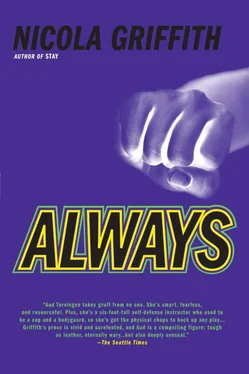“The parking lot outside Kroger,” said Nina.
“The soccer fields in Piedmont Park,” said Suze.
“So you’re walking along, minding your own business, when these three shady characters”—I couldn’t imagine a less shady trio than Therese and Sandra and Jennifer—“step across your path. It’s already clear—maybe from what they’ve said, maybe something they’ve already done, but there’s absolutely no ambiguity—it’s clear that they intend to hurt you. You either have to hurt them back, or get badly injured.”
Each immediately edged closer to her partner.
“Now what?” Nina said. “Is this where we get six feet tall?”
“This is where you set yourselves on fire. Start to swing your arms in a circle perpendicular to the floor. Big, easy circles. No muscle tension.” I demonstrated. “Start slowly. Backwards or forwards, doesn’t matter. Try it. Good. Feel the blood rush to your hands. A little faster. Clench your fists. Remember the first lesson: blam, pow, zap! Feel the blood bulging in your fists, making them heavy. Ever seen a kid windmilling on the playground? Charging at a group of other kids? That’s what you’re going to do. Faster. You’re on fire. When you charge, if they don’t get out of the way, it’s not your fault. Blam, pow, zap. Faster, as fast as you can! Charge.”
Suze bellowed like a bee-stung bullock and charged, with Christie a split second behind; Tonya leapt forward with a screech and Nina followed, laughing. Their opponents, sensibly, ran away. Tonya, still screeching, galloped after them, chasing Pauletta and Katherine, then Jennifer, who had run all the way around the wall to get away from Suze.
“Okay, quick, Therese and Sandra, Kim and Katherine, in the center. Pump your arms, charge!”
Therese did not make a sound, but I didn’t worry about that. Sandra’s silence was more troubling. Katherine squealed and Kim hooted, and the other women were shouting or laughing so much that it didn’t matter.
“And Jennifer and Pauletta, and Suze and Christie again. Mill those arms. Go!” This time I definitely heard Christie, and Pauletta made a sound a bit like a police siren. “Yell,” I said, “anything, any sound you like. All of you, attacker and defender. Make it loud. Anything. Your lungs are bellows pumping the fire.” The noise was deafening. Through it I heard Jennifer making a thin Eeeeee! like an otherworldly kettle about to boil over. Pauletta’s ululating siren began to climb in pitch, then soared into a scream that sliced across the room and brought the action stuttering to a halt like a video glitch.
“Enough. Good.” They were all grinning. Pauletta was high-fiving Nina. “If you charge like that at a bad guy and he doesn’t get out of your way, it’s not your fault he gets hurt. Clarity of communication is the key.”
“But what if one of them had a knife?” Jennifer asked.
“In that case you’d break for one of the unarmed assailants.”
“What if they all had knives?”
“I can show you variations on the hand technique to protect blood vessels and tendons, but in all likelihood you’d get some kind of cut.”
“What if one of them had a gun?”
“Handguns are notoriously inaccurate, even when the shooter is well trained. And it’s very hard to be accurate when someone is charging at you, screaming.”
“What if they all had guns?”
Or a flamethrower, a tank battalion, a tactical nuke… We could play this game forever. “You would use all that you know to stay alive. You know more today than you did yesterday. In every class you’ll understand more. But let’s be clear, there is no magic bullet, no funny handshake, no secret decoder ring. Nothing and no one can keep you perfectly safe. There are only probabilities. We prepare, we practice, we do the work, and then we try to forget about it, because no matter how big and fast and strong you are, how heavily armed or well trained, there’s always going to be someone out there who is bigger, faster, or stronger. Always.”
I LAY IN A BED, ON MY BACK. I COULDN’T OPEN MY EYES. BREATHING FELT LIKEan effort. Silk clung to my calves and forearms—clothes, no, pajamas— and I could move my arms and legs a little. Firm mattress, good-quality cotton sheets tucked in neatly, warmth but no weight—a down comforter. Very quiet. I listened to my breath: no echo, which meant soft surfaces. Not a hospital. I focused on the air moving through my nose and mouth and caught a hint of… perhaps cologne, perhaps high-end toiletries. A hotel. I couldn’t move my head. I listened harder, and felt someone outside my line of sight, watching, assessing, waiting.
MY MOUTHtasted vile. I could make out dim, reddish shadows on the ceiling that moved a little then stilled. I turned my head slowly—the signals from brain to muscle seemed to be routed through another dimension—and saw glowing numbers. A clock. A bedside table. The numbers changed again, from 5:03 to 5:04.
Someone had drugged me. They’d put it in the wine, or the kamikazes, or the coffee; sprinkled it on the food, or sprayed it on the flowers.
When I tried to sit up the world tilted violently and I had to lie down again. I panted for a while, but couldn’t seem to get my breath. When the world steadied, I raised myself cautiously onto my right elbow. I reached out and up with my left hand, which swung back and forth like a weather vane before I managed to put it on the cold lamp base and find the knoblike switch. I pushed at it three times before it clicked on. The light was cozy and yellow, but bright enough to see the phone, some clothes folded neatly on a chair, and heavy drapes. Definitely a hotel, a good one.
The dizziness hit again before I could pick up the phone.
THE LIGHTwas still on. There was a woman standing by the bed. Phone, I thought, but I couldn’t stop staring at her head.
“Are you awake?” she said.
“Your head is pink.”
“Yes,” she said, then realized what I was worried about, and touched her hair. “It really is pink. Fuchsia.”
“Um,” I said, so I didn’t have to nod.
“Dizzy?”
“Yes.”
“I’ll be right back.” She came back, too quickly for me to sit up or reach for the phone, carrying a blood-pressure cuff, stethoscope, and clipboard. “My name’s Suzanne. Left arm, please.”
It was more of an effort than it should have been to lift my arm. As I straightened it, I felt a twinge inside the elbow. She pushed up the pajama sleeve—whose? I don’t wear pajamas, but they weren’t new—and I saw the neat hole in the vein. “Let’s use the other arm.”
She wrapped the right biceps in the pressure cuff, and pumped. The back of my right hand started to ache. There was a hole in a vein there, too.
“Please keep still.” She let out the air, listened, made a note on her clipboard. Unwrapped the cuff and took my wrist in her hand.
“What—”
“Hold on.” She finished counting, made another note. “Sorry. What were you saying?”
“What day is it?”
“Saturday. Five-thirty Saturday morning. Can you sit up?”
I did, very slowly. She rubbed her stethoscope warm, then listened to my lungs and heart. I studied the clothes folded on the striped chair. They were mine, but not what I’d been wearing last night. The door to the left of the chair was double, and louvred. I was in a suite. Then I recognized the coffee and cream stripes on the upholstery: the Fairmont.
I’d been in a hospital. Police.
“You okay?”
Pioneer Square. Those things I’d said to Kuiper. Someone had done that to me.
“If you’re too warm I could strip off some of these bed covers.”
Читать дальше












